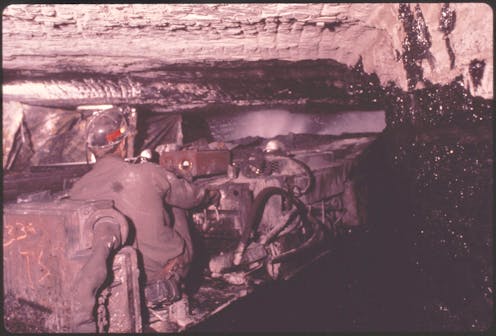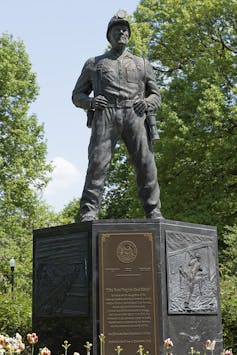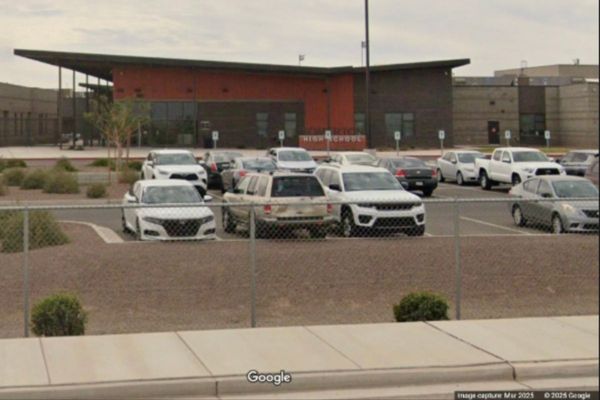
President Donald Trump recently visited West Virginia for the fourth time since taking office. He’s more popular there than in any other state, partly because of his avowed passion for coal and coal miners.
As he put it at a campaign rally in Charleston, when he visited in May 2016, “I’ve just always been fascinated by the mines and the courage of the miners.” He also promised “to put the miners back to work.”
For decades, presidents, lobbyists and policymakers have invoked the image of coal miners. In researching the history of West Virginia’s coalfield economy, I have found many examples of coal miners being used as symbols of bravery, hard work and manliness to achieve political ends.
Presidential politics
And it’s been like that for at least 60 years. The 1960 West Virginia primary, for example, was a milestone in John F. Kennedy’s bid for the presidency. At the time, many Americans questioned whether a Catholic could win the overwhelmingly Protestant state. But he did.
There, JFK shook hands with miners covered in coal dust and witnessed the effects of a growing unemployment crisis while his Republican opponent, Richard Nixon, touted the nation’s prosperity. But, Kennedy said: “He hasn’t been to West Virginia. He hasn’t seen the thousands of miners who want to work and can’t find work.”
Having witnessed suffering in coal towns, Kennedy made fighting poverty a priority. His first executive order authorized a new food stamp program. The first American to receive this government benefit was an unemployed West Virginia coal miner.
In May 1961, Kennedy signed a law to stimulate the economy in areas with high unemployment. He said that the head of the new agency had already investigated “the problem in West Virginia and … in eastern Kentucky, southern Illinois, and parts of Ohio” – all coal-mining areas.
When Lyndon B. Johnson became president, he declared an “unconditional war on poverty,” which would include “a special effort in the chronically distressed areas of Appalachia.”
On a subsequent “poverty tour,” LBJ traveled to the “roots of Appalachian poverty in Martin County, Kentucky,” where people suffered, according to a White House film, because of the “losses in the coal mining industry.”
Work ethics and whiteness
Conservatives attacked the war on poverty before it even began. Attorney General Robert Kennedy had a tense exchange at congressional hearings with William H. Ayers, an Ohio Republican, who claimed that “any set of standards” for benefits eligibility would mean there would not “be any white people in it.”

Conjuring up the image of noble unemployed coal miners helped protect these new policies. Robert Kennedy replied that if Ayers visited West Virginia, he would find many eligible white people.
When Rep. David Martin expressed his belief that antipoverty programs would stifle “individual initiative,” the attorney general asked the Nebraska Republican, “Have you ever talked to the coal miners of West Virginia and told them what they needed was individual initiative?”
The ‘war on coal’
Lately, coal industry executives – like the poverty warriors of the 1960s – are harnessing the power of the out-of-work miner in the public’s imagination, but for different reasons.
By the 1990s, companies increasingly used mountaintop removal mining, a method of surface mining that uses high explosives and massive 20-story-tall draglines. Mechanization like this decreased coal employment in West Virginia from a post-World War II high of more than 120,000 to about 14,000 by 2000.
Furthermore, a growing number of people living near surface mines complained about the dust clouds, water pollution and flooding and demanded new regulations. Studies of Appalachian mining areas have found elevated levels of toxic pollutants near mine sites as well as higher rates of mortality and lower health-related quality of life.
Sociologists Shannon Elizabeth Bell and Richard York argue that as coal employment decreased and protests against ecologically destructive practices increased, the industry intensified its public relations campaigns. In 2002, the West Virginia Coal Association created a group called Friends of Coal. The group held rallies in Charleston and Washington, D.C., to make miners and their families more visible to lawmakers. The organization framed regulations as threats, according to Bell and York, to “men’s status as the sole breadwinners.”
After Barack Obama’s 2008 election, the West Virginia Coal Association said that by imposing environmental regulations on the industry, his administration was waging a “war on coal,” rhetoric that conservative politicians soon adopted. While the War on Poverty promised government programs to help miners through temporary unemployment, the “war on coal” framing cast government as the cause of their joblessness.
Trump administration
By 2014, Trump was pushing the myth that the Obama administration’s regulations, rather than automation and competition from other energy options like cheap natural gas were solely responsible for coal industry job losses.
Two years later, Trump’s transition team vowed to end this supposed war on coal by slashing regulations. Less than a month after he took office, he signed a House resolution that reversed an Obama administration rule designed to protect streams near mining operations. The next month, when Interior Secretary Ryan Zinke ended Obama’s moratorium on coal-leasing on public lands, he said it was a “signal that the war on coal is over.”
Scott Pruitt, Trump’s EPA chief, had repeatedly sued the EPA during his time as Oklahoma’s attorney general for what he called “overreach.” As EPA administrator, Pruitt has publicly questioned the the extent to which humans contribute to climate change, echoing industry executives. He has also loosened regulations on coal ash disposal and said he wants to revoke the Clean Power Plan, Obama’s attempt to limit greenhouse gases – steps the coal industry had urged.
Coal executives are praising what the National Mining Association spokesman Luke Popovich calls a “regulatory reset,” but their industry has gained at most 1,400 jobs since Trump took office.
Meanwhile, the administration has proposed cutting programs to help coalfield communities diversify local economies and clean up abandoned mine lands, failed to address the growing black lung crisis, appointed a coal CEO with a poor safety record to head the Mine Safety and Health Administration and ignored the government’s promise to fund miners’ pensions.
While I do believe that miners are brave and hard-working, I am concerned that the White House appears to be taking advantage of Americans’ sympathy for out-of-work miners to justify rolling back regulations. And despite the American obsession with this idealized image, coal miners still face an uncertain future in real life.
Lou Martin is affiliated with the West Virginia Mine Wars Museum and is an honorary member of United Mine Workers of America, Local 1440. He has also done some advocacy work in opposition to mountaintop removal.
This article was originally published on The Conversation. Read the original article.







